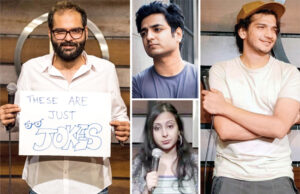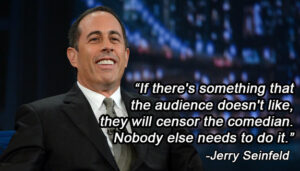
Comedy is a central part of our lives and it works as dopamine to our brain in times of stress or mental health issues. The search for authentic and relatable comedy that resonates with our lives led to a boom in the stand-up comedy industry and many stand-up comedians have come forward to bring crisp comedy into our lives.
Stand-up comedy in India is an upcoming field of creativity with the emergence of stars such as Zakir Khan, Anubhav Singh Bassi, and of course, Kapil Sharma. This field is certainly growing well. At the same time, one also has to face a lot of hurdles while navigating themselves in this sphere. Censorship is no new term in the media. When looked closer, censorship has trickled down to all forms of expression. The recent crackdown on stand-up comedians on what content they create especially on political satire is stifling and has reduced space for dissent. Writing jokes is a difficult job since the comedian never knows if the audience would laugh or not. However, bringing the same in front of the world takes courage, especially when what is being said on a public platform needs to be checked and proofread, since some people take jokes too seriously. Comedians often obtain censor certificates as proof that their shows can be watched and even go to the extent of regulation by lawyers.
The backlash by China on stand-up comedy when a comedian made fun of the military led to the fear of performing in public. The situation is no different in India, where the audience might clap back anytime. The recent case of Sakshi Dhiman who was criticised by netizens for commenting on her mother’s choices, shows how sensitive the audience can become. The arrest of popular comedian, Munawar Faruqui, has made many other comedians to be aware of their content and impose self-censorship. Faruqui was arrested in the middle of a show because one of his audiences did not like an alleged comment made by him on Hindu deities. However, it was later revealed after he was kept in custody for more than a month that there was no such remark made by him.
Finding the right balance between discussing “sensitive” topics and using sharp humour is a challenging endeavour. Many stand-up comedians believe that considering individual preferences is essential if they aim to connect with a broader audience. In the process of spreading humour, comedians often mock social, cultural, and political phenomena. They may use potentially offensive material which can either delight or anger the audience. When jokes from stand-up comedy performances are shared on platforms like social media, they face a different form of evaluation and scrutiny. Comedians may encounter a growing backlash if they are perceived to have made unpleasant or offensive jokes. Unlike a live audience, the social media audience is distant, diverse and limitless. They participate less actively and tend to evaluate jokes based on factors like political correctness.
Any dissenting voice, even from a single individual, can be magnified in the context of real-time performances. This shift in audience dynamics has introduced new challenges for comedians as their jokes are subject to heightened scrutiny and potential criticism on social media platforms. Stand-up comedians can still use humour that challenges boundaries, but they must adhere to a new set of guidelines. To be successful, they must stay within the parameters of political correctness, focusing on eliciting laughter rather than provoking anger. Navigating this shifting landscape requires considerable creativity and the ability to adapt and improvise in this new comedic environment.

Attempts to censor their content could lead to the downfall of comedy as an art form and pose a threat to the fundamental principles of the democratic right of freedom of speech and expression. Many comedians attribute the issue to political correctness, which they believe is the main factor restricting their ability to freely express their comedic perspectives without fear of repercussions. Stand-up comedians, along with many others, argue that people have become overly sensitive, leading to a potential threat to boundary-pushing humour. Even if purposefully provocative comedy offends one’s moral sensibilities, stand-up comedians serve as a crucial barometer of a society’s openness to free speech. Specifically, they offer a unique aesthetic framework in which absurdity, obscenity, offensiveness, and vulgarity are frequently welcomed as a matter of good form.
Nowadays, stand-up is frequently discussed in the news as a key issue involving the acceptance of provocative viewpoints, “cancel culture”, and freedom of speech. There is intense disagreement in the comedy community over what can and cannot be made fun of on stage.
The art of comedy is constantly changing. Comedians challenge social standards. As audiences’ tastes change, comedians either adapt or go out of style, to be replaced by someone who is successful in making the audience laugh. Social media’s growth has increased stand-up comedy’s audience and simultaneously, its potential for creating offence. Comedy often brings up universal truths regarding the human condition. We can process sadness and terror better through comedy. An effective political tool is satire. But is there a defence for humour that blatantly offends us or purposely tests our communal and individual boundaries? Are comedians who openly offend and provoke worth anything? The polished performances that audiences see, even from seasoned comedians, are frequently the product of several hours of trial and error. Jokes frequently and utterly fall flat. A joke’s inherent danger depends on the situation as well. A joke that causes a stand-up comedian to be booed and heckled on stage in one venue might result in applause in a different one. The stand-up comedian might then be said to be under just an artistic obligation to deliver material that they deem to be humorous. Therefore, how far someone would be ready to go in the name of humour relies on how we all perceive what constitutes acceptable expressive risks. Although the law gives us some fairly distinct limits on what one can say, it is considerably more important for us to identify and grasp those limits in everyday discussion and writing. Because as social creatures, we collectively make judgments about what is appropriate or inappropriate to say in various situations. Therefore, stand-up comedy should be viewed as a sociocultural setting that, for good reason, occupies the periphery of popular culture. It is a setting where delicate expressive boundaries are both made visible and put to the test through artistic experimentation and play. This is the reason why censorship can be so destructive to creative expression.
Expressive limitations change the artist’s creative calculation owing to which they may hold back on their expression not because what they wanted to say would necessarily cause unnecessary harm, but rather, because they are afraid of receiving a reaction to which there can be no rational dissent. Because of this, society, as a whole, intercepts pushy stand-up comedians.
But if we don’t give artists the freedom to fail or take risks, we can’t expect them to fulfil the necessary social purpose. In any culture, stand-up comedy aids in defining the limits of freedom of expression. While it may be tempting to argue that protection for expression should depend on its actual or perceived societal worth, a stand-up comedy that offends our moral sensibilities frequently serves an important purpose that is sometimes not immediately apparent or understood.

